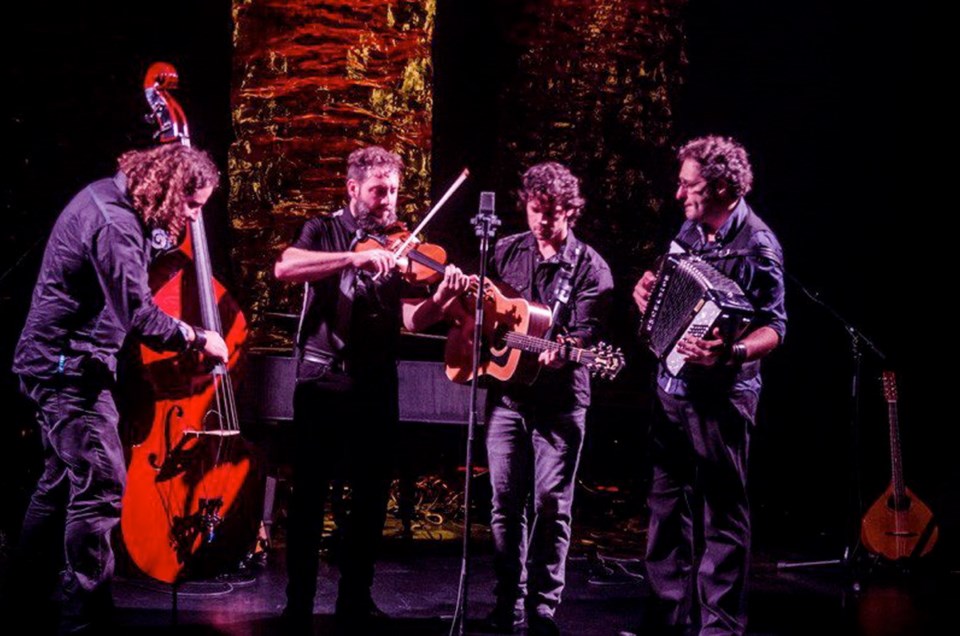Le Vent du Nord with the Victoria Symphony
Where: Royal Theatre
When: Friday and Saturday at 8 p.m., Sunday at 2 p.m.
Tickets: $18 to $75 at rmts.bc.ca or 250-386-6121, including discounts for seniors/students.
The band members of Le Vent du Nord have become used to their role as ambassadors of Québécois folk music, having performed the foot-stomping tunes across the country and abroad.
So when the opportunity to build another bridge presented itself — this time between musical disciplines — they were up for that, too.
But that doesn’t mean they weren’t a bit wary before recording an album with the Orchestre Symphonique de Québec. Folk musicians often have certain preconceived notions about classical musicians, and vice versa, according to Le Vent du Nord’s Nicolas Boulerice.
“People from classical music look at folk music as very simple, gentle music, but not very interesting. And folk musicians look at classical musicians as snobby people. So we had that prejudice to each other,” Boulerice, who sings and plays the hurdy-gurdy, piano and piano-accordion with the band, said in an interview. “We said OK, let’s do it. But basically, we’ll see.”
He’s happy they did.
Symphony partnerships with pop and folk musicians are nothing new. But Boulerice said he could see that it was different for the Quebec City-based orchestra members, when they began to read composer Tom Myron’s arrangements of Le Vent du Nord’s music.
“Their eyes opened a little bit like, ‘Oh, OK. This is different,’ ” Boulerice said. “It was really interesting, because they were looking for something with very simple arrangements. … Myron’s arrangements were much more lively and the music of our tradition is really crooked. It’s a lot more poly-rhythmic.”
Boulerice is a founding member of Le Vent du Nord (The North Wind), which formed in 2002 and has become one of Quebec’s great successes. His roots in the tradition are strong, with a family history in the province dating to 1678. Growing up in Saint-Jean-sur-Richelieu outside of Montreal, his musician grandmother taught him many of the songs that have traditionally been passed on through oral tradition. His father, a writer and poet, taught him an appreciation for lyricism.
Le Vent du Nord writes original songs, but it has also made its name performing historical Quebec songs, rich with Celtic influence and up to 300 years old, that have been otherwise unrecorded.
The band’s collaboration with the Orchestre Symphonique de Québec wasn’t its first orchestral collaboration, but it was its most substantial, paving the way for performances such as this week’s series of shows with the Victoria Symphony. The group had already played with the Portland Symphony Orchestra, where they met Myron, whom Boulerice called a key to their success.
Myron, an American, had no experience with traditional Quebec music and approached it as he would any other project, Boulerice said. Le Vent du Nord would write music for their parts and submit it to Myron, who brought some wisdom about which songs were conducive to the crossover.
“Sometimes we asked him to do an arrangement with that song and he’d say, ‘Nope, not that one. I have nothing to say with that one,’ ” Boulerice said.
Normally, the orchestra members leave the performance area during their break. But during that first rehearsal with the Orchestre Symphonique de Quebec, they stuck around to listen.
“They stayed in the room to listen to the tunes. We thought, oh this is something different,” he said.
The first violinist approached fiddler Olivier Demers to ask how he drew different sounds from the instrument. Demers was equally amazed by the first violinist’s technique.
Boulerice said each was realizing just how differently they played the same instrument.
“They just discovered that it’s like another instrument, depending on how you play it.”
Similarly, the conductor had to follow Demers’ foot-tapping, while the members of Le Vent du Nord, who have never declared a true leader, learned what can be gained from having a dedicated conductor.
“[We learned from] the feeling they put on it, the way they read the music and they really try to follow the movement. It’s really weird for us, because we don’t have any conductor, but that relationship they have with a conductor, it’s inspiring,” he said.
